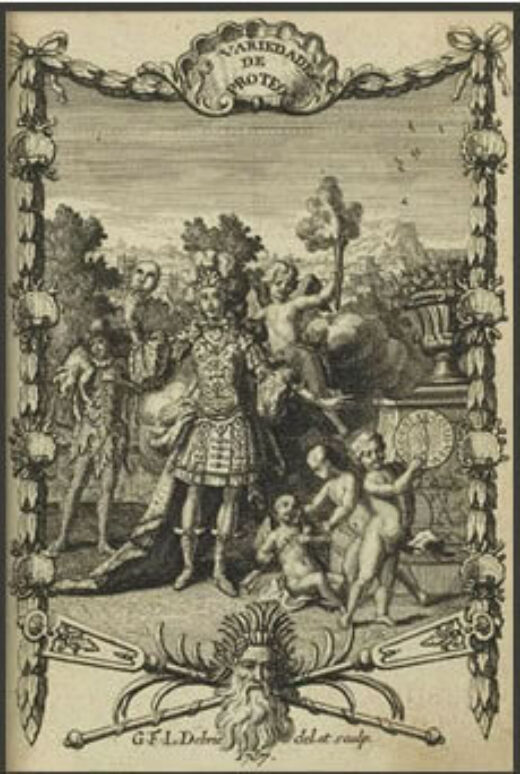
Printed
105 pages
Author(s)
As Variedades de Proteu
As Variedades de Proteu (Proteus’s Metamorphoses) was staged in May 1737 at the Bairro Alto theatre, with music by Antόnio Teixeira. In this play, da Silva continued to work with mythological figures from an antique repertoire: the water deity Proteus, known for his gift of prophecy and shape-shifting power, indeed appears in texts by Virgil and Ovid. He also inspired Charles-Hubert Gervais and Joseph de La Font’s opera Les Amours de Protée (Proteus’s love affairs), which met with great success in 1720 and was staged again several times during the first half of the 18th century.
Da Silva’s play is built on a paradox: Proteu (Proteus) is the very figure of inconstancy, yet his love is firm. The playwright composed a féérie with several tableaux, using baroque machinery (for the scenery, the characters, …) to bring the marvellous to the stage. In his last two plays, As Variedades de Proteu and Precipício de Faetonte (The Fall of Phaethon), da Silva broke away from a two-part structure, and divided his play into three acts instead. Teixeira’s music (this is the only score of his which has been preserved) is rich in various tones and forms: the play features twenty-three musical passages, among which are many arias switching between sung menuets, ballads or sonatas, orchestral pizzicati, ...
The plot opposes two romantic couples, whose stories overlap; a romantic duo of servants provides a burlesque contrast to their story. The character of Proteu is used to stage marvellous passages: he transforms into an element of the scenery (a mountain), but also into objects (a vase of flowers, a clock); indolent, he goes as far as assuming the identity of the King. Meanwhile, his gracioso (comical valet) Caranguejo also has shapeshifting abilities; in a more burlesque mode, he changes into a pig, a chair, or a vase of flowers.
In addition to the criss-crossed plot, the play includes a series of baroque themes such as the concealment of identity, a fake scene of madness, a punch badly aimed, and a double marriage, all of which unfold in a pastoral atmosphere that may at any time change into a nightmarish hunt. Caranguejo, a master of macaronic Latin and of the exegesis of burlesque allegories, makes a metatheatrical allusion to the puppets (bonifrates) of the Bairro Alto theatre, as he comments on the conversation between Proteu and his brother Nereu (Nereus): “Quando fratres sunt boni, sunt bonifrates”.
As Variedades de Proteu was staged at the Teatro Avenida in Buenos Aires in 2006. The performance was produced by Carlos Almeida and directed by Tito Loréfice; it was also recorded by the musical director Stephen Bull.
A prince promised to a princess is in love with another woman
The King Ponto is planning the weddings of his sons: Proteu (Proteus) will marry Dórida, the princess of Egnido, and Nereu (Nereus) will marry Cirene (Cyrene), whose father Políbio has introduced as the Princess of Beócia (Boeotia). Proteu is lamenting his fate because he is in love with Cirene. He tries to convince his father to let him marry her instead of Dórida. Meanwhile, Nereu is happy to be marrying a princess of royal blood; but he cannot appreciate Cirene’s beauty, and she reproaches him for it. Caranguejo introduces himself as a minister of Venus and tries persuading Maresia to marry him; having made a vow of chastity to Diana, she refuses. During a royal hunt, Cirene demands that the King cancel her marriage; as for Dórida, she thinks that Proteu is not eager enough to marry her. A wild boar attacks Maresia; it is in fact Caranguejo, who transforms back into his human form to kiss her. Cirene falls asleep on a mountain covered with flowers, which is in fact one of Proteus’s forms: when the young prince transforms back into himself, Cirene is in his arms.
The King decides to bring the two weddings forward to pacify the two princesses. Cirene asks Nereu to love her for herself and not for her lineage, but he cannot do so. As for Proteu, he wishes that Cirene were not a princess so that he could be free to love her. Cirene confesses to her father Políbio that Proteu loves her, and she explains that her marriage with Nereu will be unhappy because she is pretending to be someone she is not. Políbio refuses to change his plans. Sitting on a chair which is in fact Caranguejo, Maresia ends up in the servant’s arms. Cirene is watching the clock into which Proteu has transformed to confess his love to her. While she is about to reveal that she is not a princess, her father interrupts her. Proteu and Políbio fight. Cirene intervenes; Proteu wounds her and, hopeless, tries to kill himself. Políbio confiscates his dagger and is then accused of attempted murder.
Cirene demands that Políbio be freed, but the King says that he will only free her if Nereu agrees. Proteu, who transformed into a vase of flowers, decides to die to give Cirene satisfaction. Despite the latter’s pleading, Nereu refuses to agree to Políbio’s release. Maresia is arranging flowers; they are in fact Caranguejo, who begs her to marry him. As Nereu has Políbio taken to the temple of Astraea to put him to death, Proteu arrives with arms to free the prisoner. The brothers duel. Proteu is captured on orders of the King, but he then transforms into the King himself. At the temple, where the sacrifices are to be made, Cirene reveals her true identity. Nereu cancels their marriage, and Proteu proposes to her. The play ends with three weddings: Nereu marries Dórida; Proteu marries Cirene; and Caranguejo marries Maresia.
First performance
Theatro do Bairro Alto
Publications and translations
Theatro comico português, vol. II, Lisboa, Francisco Luis Almeno, 1744
António José da Silva (O Judeu), Obras completas, vol. IV. Lisboa: Livraria Sá da Costa, 1957
